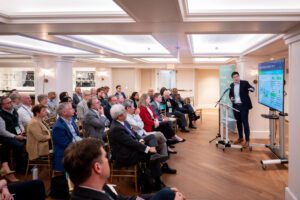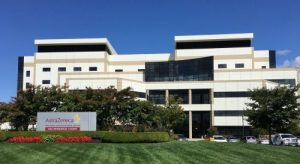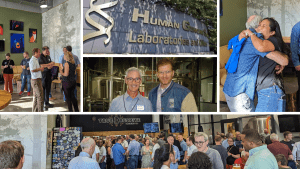
Emerging T Cell Therapy Company NexImmune Receives First IND Clearance for Phase 1/2 Trial in Acute Myeloid Leukemia / Myelodysplastic Syndrome
October 31, 2019 07:30 ET | Source: NexImmune, Inc.
- IND clearance enables commencement of clinical trial to evaluate NEXI-001 in AML/MDS patients with relapsed disease after allogeneic stem cell transplant
- IND clearance validates Company’s Artificial Immune Modulation (AIM) nanoparticle technology platform
- Subsequent IND submission to evaluate NEXI-002 in relapsed / refractory Multiple Myeloma patients expected before end of 2019
GAITHERSBURG, Md., Oct. 31, 2019 (GLOBE NEWSWIRE) — NexImmune, a clinical stage immunotherapy company developing novel T cell therapies, received Investigational New Drug (IND) clearance for the company’s first cellular therapy product. NEXI-001 is being developed for the treatment of acute myeloid leukemia (AML) or myelodysplastic syndrome (MDS) patients with relapsed disease after an allogeneic hematopoietic cellular transplant (allo-HCT).
Scott Carmer, NexImmune’s President and CEO, commented “we are excited to initiate clinical trials with NEXI-001, and to provide these patients with a promising new treatment option. NEXI-001 is a product that is meaningfully differentiated from other cellular therapies in that it contains multiple populations of antigen specific endogenous T cells with enhanced anti-tumor properties. Because of this, we are hopeful NEXI-001 will address key limitations observed with other cellular immunotherapies; specifically, tumor escape through single target down-regulation and tumor relapse due to diminished T cell persistence.”
The Phase 1/2 trial of NEXI-001 will begin enrolling patients at clinical sites across the United States, including Memorial Sloan Kettering, MD Anderson, The City of Hope, The Dana Farber Cancer Institute, and AdventHealth. The trial is a multi-center, dose-escalating, open-label, single-arm study evaluating the safety, tolerability and initial efficacy of adoptively-transferred donor-derived T-cells as a treatment for AML or MDS patients with relapsed disease after allo-HCT. The trial will evaluate two increasing dose levels, with three patients enrolled in each dose escalation cohort. After the initial safety evaluation phase, up to 20 patients will be enrolled in the dose expansion phase. All patients will be followed for at least one year.
Miguel Perales, MD, Deputy Chief of Bone Marrow Transplant Services at Memorial Sloan Kettering Cancer Center and the trial’s lead investigator, stated “for patients receiving T cell therapy after allo-HCT, the primary treatment goal is to separate the efficacy benefits of Graft-versus-Leukemia (GVL) from the toxicities associated with Graft-versus-Host Disease (GvHD). This requires the ability to deliver a cell therapy product that contains a significant proportion of leukemia antigen specific memory T cells, and few-to-no T cell subtypes with allo-reactive potential. NEXI-001 could represent a T cell product with potential to deliver against these key treatment goals.”
Lee Greenberger, MD, Chief Scientific Officer at The Leukemia and Lymphoma Society, commented further, “patients who relapse after allo-HCT are left with a dismal prognosis and limited treatment options, and are in need of new treatments that offer significant benefit. LLS is proud to partner with NexImmune on the development of products like NEXI-001 through our Therapy Acceleration Program (TAP). We believe this unique technology has the potential to meaningfully benefit patients who are in urgent need of novel approaches to treating this disease.”
About AML / MDS relapse after Allogeneic Hematopoietic Cellular Transplant
Among patients with Acute Myelogenous Leukemia (AML) or Myelodysplastic Syndrome (MDS), allogeneic hematopoietic cellular transplantation (HCT) used as post-remission therapy for those with high-risk genetic profiles or as salvage therapy for those with disease refractory to chemotherapy offers the highest potential for long-term survival. However, relapse after allogenic HCT remains the major cause of treatment failure, is associated with an extremely poor prognosis, and represents a major therapeutic challenge. In this situation, no standard therapy is defined, but treatment options generally aim to reduce disease burden and to enforce a graft-versus-leukemia (GVL) effect. Commonly used treatment options for these patients are chemotherapy combined with cellular-based approaches, such as donor lymphocyte infusion (DLI)or second transplantation.
About NEXI-001
NEXI-001 is an endogenous cellular therapy and includes populations of primed antigen specific CD8+ cells directed at multiple leukemia relevant antigen targets. Generating T cells against multiple tumor targets minimizes the potential for tumor escape. In addition, NEXI-001 contains T cell subtypes that are predominantly memory phenotypes, with the majority being characterized as stem cell memory and central memory T cells. Importantly, each NEXI-001 product contains minimal populations of naïve T cells (average <5%). Minimizing the naïve T cell compartment reduces allo-reactivity and Graft-versus-Host Disease (GvHD) in patients after an allo-HCT, while T cell products that contain high proportions of memory cells, particularly central memory and stem cell memory, have been associated with potent anti-tumor activity, long-term T cell persistence and durable anti-tumor response.
About NexImmune
NexImmune is a clinical-stage biopharmaceutical company developing novel immune-therapeutics based on the proprietary Artificial Immune Modulation (AIM) nanotechnology platform. The AIM platform enables the ability to expand multi-antigen specific T cells with enhanced anti-tumor properties without the need for genetic manipulation. NexImmune is using the AIM technology platform to develop a pipeline of products to treat cancer and auto-immune diseases.
The AIM platform is comprised of two core components: (1) a synthetic nanoparticle that functions as an artificial antigen presenting cell (aAPC) to prime and activate T cells directed at multiple tumor antigen targets across a broad range of both solid and hematologic malignancies; and (2) a proprietary T cell enrichment and expansion (E&E) process that controls ex vivo T cell proliferation and subtype differentiation. In preclinical experiments, the AIM system demonstrated the ability to enhance naturally occurring tumor cell recognition, engagement and signaling mechanisms that increased the anti-tumor potency, target specific killing and long-term durability of endogenous cytolytic T-cells. Utilizing natural target recognition and killing mechanisms may also reduce the potential for allo-reactive toxicities observed with genetically engineered T cell therapies. The Company’s aAPCs have also demonstrated potential utility as both injectable and cellular therapeutic agents.
For more information visit: www.neximmune.com
Contact
Chad Rubin
Solebury Trout
[email protected]
+1-646-378-2947
- About the Author
- Latest Posts
Over the past 11 years, Chris has grown BioBuzz into a respected brand that is recognized for its community building, networking events and news stories about the local biotech industry. In addition, he runs a Recruiting and Marketing Agency that helps companies attract top talent through a blended model that combines employer branding and marketing services together with a high powered recruiting solution.





